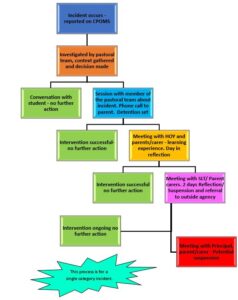“Good schools encourage good behaviour through a mixture of high expectations, clear policy and an ethos which fosters mutual respect between pupils and between staff and pupils. Good behaviour is a necessary condition for effective teaching to take place”. (Department for Education)
We, the students, staff, parents/carers and Academy Council of Tewkesbury Academy aim to ensure students are ready, responsible and respectful. We will ensure the Academy is positive, unapologetically academic and has high standards. We believe this is achieved through quality first teaching, recognising, and rewarding achievements, providing opportunities for all, and upholding high standards of discipline, attendance and punctuality.
The Academy works in partnership with Parents and Carers to promote positive discipline and encourage students to make the right choices. Parental involvement and interest are actively encouraged through communication (Class Charts, emails, telephone calls, parental meetings, and annual Parent Evenings). We believe raising standards is the collective responsibility of all staff and students at the Academy. Students will be encouraged to uphold high standards and help create a sense of community throughout the Academy. Staff will consistently seek to adopt a positive approach to student discipline in ensuring a safe and secure environment in which learning can flourish and prosper.
We believe that poor behaviour in school affects learning and can impact on the well-being of all and, therefore, this policy statement applies to the whole of the Tewkesbury Academy community.
This policy aims to:
At Tewkesbury Academy, students are rewarded for their good work, effort and behaviour and their success is celebrated both within the Academy and more widely with parents, carers and external agencies. We believe all children and staff have the right to always feel safe whilst in the Academy and on their way to and from school. There should be mutual respect between staff and students and between each other. No pupil has the right to disrupt the learning of others. Teachers will have disruption free classrooms in which they can teach, and pupils will have disruption free classrooms in which they can learn. On a lesson-by-lesson basis, students will have one simple choice, to either be in class working hard and progressing with their learning or to be separated from their peers so that the learning of others is not disrupted.
Behavioural issues are dealt with at the lowest possible level by calm, consistent adults with the individual teacher initially being responsible for any issues in their classroom that are preventing effective learning.
Threatening or violent behaviour, disrespectful treatment of staff, involvement in substance abuse, hoax fire alarms, the possession of weapons and persistent failure to adhere to school’s expectations always result in very serious consequences.
Discipline in schools – teachers’ powers
Students should be aware of what is expected of them and take responsibility for their actions.
Around the Academy, we expect students to:
In the classroom, we expect students to:
On trips/visits, we expect students to:
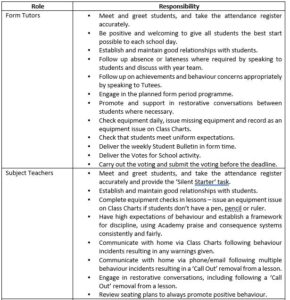
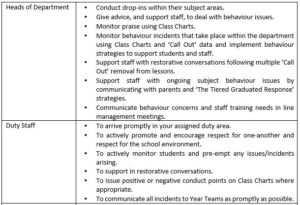
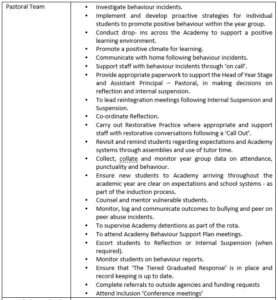
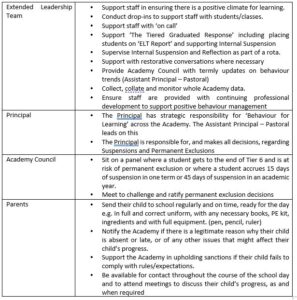
We believe in rewarding effort, recognising achievement, and encouraging students to aspire to exceed our expectations. Rewards are a very powerful tool for staff to use. A student, whose achievements are recognised in any way, whether publicly or in private, is more likely to make a positive impact within the Academy community. A clear framework for rewards and praise allows all students to be recognised, rewarded, celebrated, and recorded.
We use an extensive range of rewards: e.g., verbal praise, positive conduct points on Class Charts, certificates, postcards, vouchers, celebratory breakfast/lunches, class rewards and treats, sports awards and ties and reward activities/trips. Students’ achievement points are recorded on Class Charts. Achievement points are also communicated to Parents/Carers through each of the data collection reports that are posted home.
As an Academy, we offer a range of rewards to:
What should we praise? – The things which encourage a ‘growth mindset’.
All Teachers are expected to:
All Heads of Department are expected to:
All Year teams are expected to:
Each week:
At the end of each half term:
Following each data collection:
At the end of each term (in addition to content for half termly praise assemblies):
All form tutors are expected to:
Reasonable and proportionate sanctions can be applied by any paid member of staff or member of staff authorised by the Principal. A ‘Tiered Graduated Response’ (see Appendix 1) of sanctions is implemented to address behaviour issues ranging from a verbal warning to the permanent exclusion of a child from the school. The most commonly applied sanctions are set out below and in sections 8-14 of this policy, but this is not and exhaustive list.
Choices and consequences in lessons:
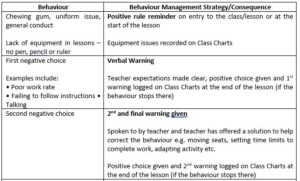
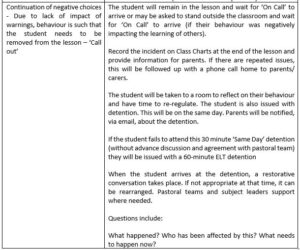
Choices and consequences in unstructured times and around the Academy site:
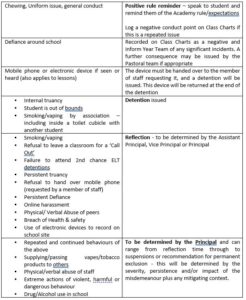
Detentions
We always message to inform parents/carers of detentions despite the absence of any legal obligation to do so. We believe it is courteous and promotes good home-school partnership working if we send out a message. Students in detention will also always be given the opportunity to use a school phone to inform parents/carers that they are being detained if they are unsure that parents are aware.
There are multiple types of detention at Tewkesbury Academy:
Students in lunchtime detentions will always be given the opportunity to eat, drink and use the toilet.
In issuing a detention, staff will consider whether the student is at risk as a consequence of the detention, is a young carer and whether travel arrangements can be made. Responsibility for making appropriate travel arrangements rests with the parent/carer, even if inconvenient. Whilst the school always looks to work constructively with parents/carers it is not for the school to adjust its behaviour policy if the detention is inconvenient to the parent/carer or the child. It is important that students take responsibility for their choices and behaviours.
Tewkesbury Academy has a Reflection room to help manage student behaviour. Students are provided with a laptop/Chromebook and electronic resources, or paper-based work from their teachers or for the Core Subjects. Students are expected to work in silence for the period of time they are booked in for – this is stated on the Reflection booking sheet for each student. Whilst in Reflection, students are expected to work in silence and are provided with toilet breaks and a lunchbreak. Students must also continue to adhere to the Academy uniform requirements whilst in Reflection. Students must also hand in their mobile phone on arrival. Reasonable adjustments are made where appropriate to support students to be successful in Reflection.
Students receiving repeated detentions and/or causing concern across a number of areas may be put ‘on report’ to their tutor, Head of Year or a member of the Extended Leadership Team, depending on where their behaviour sits in the ‘Tiered Graduated Response’. Clear targets are set for the student and teachers have to comment on the report card after every lesson. The card is then signed daily by the parent/carer and the member of staff. This is a way of closely monitoring progress and encouraging better behaviour. At the end of the period on report, it will be reviewed whether the student can successfully complete their report or whether they will remain on it. The outcome of this decision will be communicated to parents/carers and teaching staff. Where the report shows no improvement then further action will be taken.
Inclusion is at the heart of Tewkesbury Academy, and we aim to be one school for the whole community. We are committed to ensure we are doing all we can to engage students in a learning experience, which meets the needs, aspirations and interests of all. We recognise and acknowledge that sometimes students need extra support in order to achieve their full potential.
For any student with SEND, reasonable adjustments and targeted support should be considered as part of SEND planning and reviewed as required under the Equality Act 2010. Where a sanction is imposed, consideration will be given to the need for reasonable adjustments or targeted support to assist the student. See SEND policy for specific information about meeting the needs of students with SEND.
We have a ‘Tiered Graduated Response’ to persistent misbehaviour and where students are routinely not engaging in their own learning or disrupting the learning of others, we will work with parents/carers to ensure support is in place to try to improve the situation. Some of this support can be offered within school and some will require support and engagement from parents outside of school. This can be through extra pastoral check-ins, the development of a trusted adult relationship within the school, encouraged engagement in extra-curricular or leadership opportunities to further embed the student as a part of our community. This may also be in the form of academic and/or social, emotional and health interventions, support in lessons, support by providing extra work, referrals to various agencies including mentoring services and mental health support. We can support families to access help and guidance as well as working together to ensure students understand the boundaries in place for them. We also have a graduated response to discrimination that covers all homophobic, racist, misogynistic, ablest and other forms of discrimination (see Appendix 2). This includes intervention, education and sanction.
We can start the graduated pathway for unmet need and will often support students with a pupil passport and positive strategies and reasonable adjustments for them that can have a big impact when they engage in meeting the expectations set out alongside them. Our Pastoral and Inclusion Teams are staffed by specialist staff who offer specific skills and a wide range of contacts to work with students in this regard.
More serious offences and/or persistent misbehaviour are dealt with by fixed term suspensions. The Principal will issue a suspension when a student has displayed extreme behaviour or persistent misbehaviour. The individual needs of the student will be considered carefully before issuing a suspension. When issued with a first suspension, the readmission meeting will involve a detailed plan for the student to help identify and address underlying causes of poor behaviour. This is monitored by the Academy.
Suspensions are issued in accordance with DfE statutory guidance (May 2023). All suspensions include an initial phone call home to inform Parents/Carers of the incident/situation. A letter is sent to Parents/Carers which states the type and length of the suspension and arrangements for reintegration. Work is provided for students who have been issued a suspension. The reintegration meeting will be held with an appropriate member of staff, the Parent/Carer and the student. Other professionals such as staff from Safeguarding, Wellbeing, Alternative provision, Inclusion, SEND dept. may be invited if relevant to the needs of the student. The meeting provides an opportunity to discuss any concerns or issues which need to be addressed to allow the student to be successful. Following the reintegration meeting, the student may be required to complete some time in Reflection before joining mainstream lessons. There will be an opportunity for a restorative conversation during this time or at an appropriate time if decided in the reintegration meeting.
Fixed term exclusions would be issued for such things as verbal abuse of staff, persistent defiance and failure to follow Academy rules, physical violence, bullying, malicious and unfounded allegations against staff, vandalism and destruction of property, discriminatory language/behaviour, unsafe behaviour etc. This list is not exhaustive and decisions about exclusions are made by the Principal on a case-by-case basis. Judgements are based on the principle of ‘balance of probabilities’ after considering the relevant facts.
Behaviour Support Plan and Managed Move
Behaviour Support Plan (school contract)
When a student is at risk of Permanent Exclusion, the student may be monitored on a Behaviour Support Plan by the Vice Principal/Assistant Principal – Pastoral. Parents/Carers and the student are invited to an initial meeting to set targets to help improve behaviour. They attend subsequent meetings at 4 weekly intervals to monitor progress towards targets and agree support/intervention where required.
Managed Move
Tewkesbury Academy works in partnership with other schools in the area and may consider a ‘managed move’ as an alternative route in order to avoid permanent exclusion or where it is deemed that a fresh start somewhere else would be of benefit.. This involves allowing the student to complete a trial period at another school, with a view to a permanent move if the trial is successful.
In the case of repeatedly inappropriate behaviours from a student or a very serious breach of the Academy’s expectations for behaviour, the Academy Council have delegated authority to the Principal to direct a child’s education to an Alternative Provision, either on a temporary or permanent basis. This includes Abbey View, the school’s shared Alternative Provision Free School in Tewkesbury. Under such circumstances, the Principal would have to consider whether the Alternative Provision could adequately meet the educational needs of the student and then whether the safety and well-being of other children already at the Alternative Provision would not be compromised. In such cases the parent/carer would be notified in advance of the time to be spent at Alternative Provision and given the contact details of the Principal. The placement would be reviewed over time and the student re-integrated back into mainstream school if and when it was considered appropriate.
This can be full time or part time as part of a hybrid education provision approach looking to support with modifying extreme and persistent behaviours.
Redirecting a child’s education to Alternative Provision is a last resort but NOT the same as a permanent exclusion. A parent/carer does not have the right to appeal against the re-direction of their child’s education to Alternative Provision in the same way as they would with a fixed term suspension or permanent exclusion.
A Permanent exclusion is a decision made by the Principal and is not a decision taken lightly. It can be a result of a one-off serious incident or a series of incidents over a period of time. Any permanent exclusions are made in accordance with the DfE statutory guidance (May 2023).Permanent exclusions would result in a child initially moving
to a pupil referral unit and then transferring to another mainstream school.
Permanent exclusions are rare and are used as a last resort. In making a decision to permanently exclude a child the Principal refers to the DfE Guidance on Exclusions which currently states: –
A decision to exclude a pupil permanently should only be taken:
A parent/carer has the right to appeal against a permanent exclusion and details of that process are explained in the communication from the school. A panel of Academy Council members also meets to consider any permanent exclusion made by the Principal.
A student can be permanently excluded by the school should their behaviour fail to improve at an Alternative Provision. This would, again, be a last resort, and come after an Academy Council hearing, a meeting with parents and a final warning from the Alternative Provision.
Smoking/vaping on the school site is illegal.
Neither smoking nor vaping are allowed by students whilst at the Academy, in the vicinity of the academy, on the way to and from the academy or whilst on school trips and visits. Shisha pipes/pens, cigarettes, vapes and e-cigarettes are all strictly banned items and will be lawfully seized by staff along with any tobacco or liquid cartridges when a student is found in possession of them on the school site.
If a student is caught smoking or vaping, they will be sanctioned. Such students may also be directed towards external agencies that help young people to quit smoking.
If a student persists in smoking/vaping, then increased consequences will follow.
Chewing gum and carbonated drinks (including high-energy drinks) are not allowed in school. If seen, they will be confiscated and thrown away.
These are completely forbidden in school, to and from school or on educational trips and visits. The school will take severe action and may inform the Police.
Knives of whatever size or purpose and other offensive weapons are completely forbidden in school. It is an offence to carry a knife or other offensive weapon on the school premises. The school will take severe action and will inform the Police.
Please refer to the separate Academy Uniform policy which can be found on the school’s website for comprehensive guidance.
It is the school expectation that parents/carers will send their child to school regularly and on time, ready for the day e.g. In full and correct uniform, with any necessary books, PE kit, ingredients and with full equipment. (pen, pencil, ruler)
Where a student is not in correct uniform, they will be asked to address this and if required, as part of our commitment to being an inclusive school, a change of clothes (including appropriate school shoes) will be provided by the school. Refusal to address incorrect uniform will result in sanctions in line with our approach to defiance.
Mobile phones are not allowed to be seen or heard on site. If a student is found using a mobile phone at all or other electronic device (outside of the times and locations agreed by the school), they can expect to have it confiscated and either returned to them at the end of the day, following a Same Day Detention or when this is a repeat offence, collected by parents/carers. Refusal to hand over such devices will result initially in time in Reflection and, thereafter, in a graduated sanction. Phones must not be switched on whilst on the site UNLESS it is for contacting parents for a lift after the end of the school day. In this instance the call must be made in the student reception area. This rule also applies to the use of headphones and MP3/music players except for those handed out by a member of staff in a computer or music room.
Introduction
“Ensuring school staff and students feel safe and secure is vital to establishing calm and supportive environments conductive to learning. Using searching, screening and confiscation powers appropriately is an important way to ensure pupil and staff welfare is protected and helps schools establish and environment where everyone is safe”. (Searching, Screening and Confiscations, 2022)
“Schools and their staff are an important part of the wider safeguarding system for children. This system is described in the statutory guidance Working together to safeguard children. Keeping children safe in education makes clear that all school staff have a responsibility to provide a safe environment in which students can learn”. (SSC guidance, 2022)
Searching can play a critical role in ensuring that schools are safe environments for all students and staff. It is a vital measure to safeguard and promote staff and student welfare, and to maintain high standards of behaviour through which students can learn and thrive. Searches are used to ensure the safety and wellbeing of the Academy community. Any search will be completed away from communal areas, public viewing and in a suitable location. Searches will, wherever possible be done with the consent of the student, with clear aims, expectations and support available being shared.
Tewkesbury Academy’s Behaviour Policy, 2023 and the Keeping Children Safe in Education Policy makes clear that all school staff have a responsibility to provide a safe environment in which students can learn.
Education Act, 1996
Searching, Screening and Confiscation July,
2022 Keeping Children Safe in Education September 2022
www.gov.uk/school-discipline-exclusions/searches
Education and Inspection Act, 2006
Searches are used to ensure the safety and well-being of the Tewkesbury community. The Academy and staff will always aim to complete a search with the consent of a student. DfE guidance states that “The authorised member of staff should always seek the co-operation of the student before conducting a search”. Searching, Screening and Confiscation – GOV.UK However, the school does not need consent to search a student if they think the student has a prohibited item.
“Headteachers and staff they authorise have a statutory power to search a student or their possessions where they have reasonable grounds to suspect that the student may have a prohibited item” Searching, Screening and Confiscation – GOV.UK.
If there is a risk of harm to a person if the search is not conducted immediately, a child may be searched by a person of the opposite sex and without another member of staff present.
The Department for Education states that “When exercising their powers, schools must consider the age and needs of students being searched or screened. This includes the individual needs or learning difficulties of students with Special Educational Needs (SEN) and making reasonable adjustments that may be required where a student has a disability.” Schools should consider this guidance when considering the use of a search as an intervention strategy. Searching, Screening and Confiscation – GOV.UK
Searches will be non-intrusive. Any search will be completed in a suitable location with at least 2 members of staff present. Searches will be carried out by a member of staff who has been authorised to do so.
Before carrying out a search the authorised member of staff will:
If the student refuses to agree to a search, the member of staff can give an appropriate behaviour sanction. If they still refuse to cooperate, the member of staff will contact the Principal / Designated Safeguarding Lead, Deputy Safeguarding Lead or Pastoral Team to try and determine why the student is refusing to comply. Parents/carers may be contacted and invited into school (where appropriate) to support the search. The student will remain under supervision and separate from the school community until the search has been completed or other appropriate action taken.
The authorised member of staff may use a metal detector to assist with the search.
An authorised member of staff may search a student’s outer clothing, possessions or lockers.
They will not request the removal of any clothing other than outer clothing.
Outer clothing includes:
“‘Possessions’ means any goods over which the student has or appears to have control – this includes desks, lockers, bags etc” Searching, Screening and Confiscation – GOV.UK
Possessions can include:
A student’s possessions can be searched for any item if the student agrees to the search. If the student does not agree to the search, staff can still carry out a search for prohibited items. An authorised member of staff can search a student’s possessions when the student and another member of staff are present. If there is a serious risk of harm, if the search is not conducted immediately, or it is not reasonably practicable to summon another member of staff, the search can be carried out by a single authorised member of staff with or without the student in attendance.
A search can be carried out if the authorised member of staff has reasonable grounds for suspecting that the student is in possession of a prohibited item or any item identified in the school rules for which a search can be made, or if the student has agreed. An appropriate location for the search will be found. Where possible, this will be away from other students. The search will only take place on the school premises or where the member of staff has lawful control or charge of the student, for example on a school trip.
Metal detectors / Use of metal detector to perform self-search
Schools can use a metal detector to search for prohibited/banned items – they do not have to suspect that a student has a weapon. If a student refuses to go through, or be searched with a metal detector, they can be stopped from coming into school.
When a handheld wand is to be used the same pre-search procedure and discussions are to be followed.
Involvement of police and other agencies
As a result of any search, it may be necessary for external agencies or the police “to be involved”. Where this is the most appropriate course of action, parents/carers will be informed where appropriate.
The following are prohibited and are not allowed in the Academy:
Any prohibited items (see examples above) found during searches will be held by the Academy until they can be passed to the relevant parties or deposed of. Those in bold will be disposed of or passed to third parties in all cases and not returned to parents or students. Items will be stored in a secure location.
All members of Academy staff have a legal power to use reasonable force. This can be used to control or restrain students to prevent them from committing an offence, injuring themselves or others, from damaging property, or causing disorder.
‘Reasonable force’ covers the broad range of actions used by staff that involve a degree of physical contact to control or restrain children. ‘Reasonable’ in these circumstances means ‘using no more force than is needed’.
The decision to physically intervene depends on individual circumstances and the professional judgement of the staff member.
Additional Sources of Information:
Behaviour in schools’ guidance (publishing.service.gov.uk)
2. Searching, Screening and Confiscation – Advice for Headteachers, staff and Governing bodies, September 2022
Searching, Screening and Confiscation (publishing.service.gov.uk)
3. Use of reasonable force – Advice for Headteachers, staff and Governing bodies, July 2013
DfE advice template (publishing.service.gov.uk)
4. DfE Behaviour and Discipline in Schools – Advice for Headteachers and School staff February 2014
Behaviour and Discipline in Schools – A guide for headteachers and school staff final draft.docx (publishing.service.gov.uk)
All members of Academy staff have a legal power to use reasonable force. This power applies to any member of staff at the Academy. It can also apply to people whom the Principal has temporarily put in charge of students, such as unpaid volunteers or parents/carers accompanying students on an Academy organised visit.
Reasonable force can be used to prevent the student from hurting themselves or others, from damaging property, or from causing disorder. In a school, force is used for two main purposes – to control the student or to restrain them. The decision on whether or not to physically intervene is down to the professional judgement of the staff member concerned and should always depend on the individual circumstances. 2 Section 93, Education and Inspections Act 2006
The following list is not exhaustive but provides some examples of situations where reasonable force can be used.
Tewkesbury Academy can use reasonable force to:
All instances of restraint or use of reasonable force are recorded and investigated to ensure that they meet all guidance and lessons that can be learnt to avoid them in the future, can be learnt.
Sexual violence and sexual harassment can occur between two children of any age and sex. It can also occur through a group of children sexually assaulting or sexually harassing a single child or group of children. Children who are victims of sexual violence and sexual harassment will likely find the experience stressful and distressing. This must never be dismissed as “banter” or “part of growing up.”
It is important that all victims are taken seriously and offered appropriate support.
Incidents of this kind will be managed on a case-by-case basis in line with the most up to date guidance. They must be referred to the Designated Safeguarding Lead and further referrals will be made to outside agencies such as Children’s Services and the Police as appropriate.
This policy should be read in conjunction with the following policies:
Appendix 1 – ‘Graduated Tiered Response’
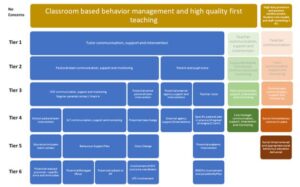
Appendix 2 – Graduate response to discrimination
